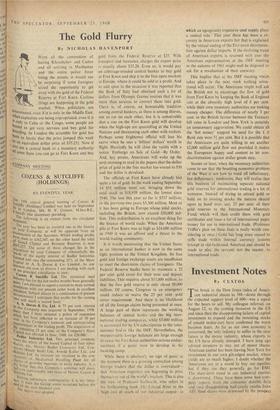The Gold Flurry
By NICHOLAS DAVENPORT , _marding. In London the scramble for gold has been so hectic that the price jumped this week ° an equivalent dollar price of $35.251. Now if 1'°11 are a central bank or a monetary authority of some State you can go to Fort Knox and buy gold from the Federal Reserve at $35. With transport and insurance charges the export price 1,; usually about $35.20. Even so, it would pay an arbitrage-minded central banker to buy gold at Fort Knox and ship it to the free open markets in Europe, where it could be sold at a profit. And to add spice to the occasion it was reported that the Bank of Italy had obtained such a lot of dollars from Olympic Games tourists that it was more than anxious to convert them into gold. There is, of course, an honourable tradition among central bankers, as there is among thieves, not to rat on each other, but it is conceivable that a run on the Fort Knox gold will develop when the high-ups are quarrelling at the United Nations and threatening each other with rockets. Perhaps some frightened official will lose his nerve when he sees a 'billion' dollars' worth in flight. Hurriedly he will close the vaults with a notice 'Embargo on Sale of Gold—By Order.' And, hey presto, Americans will wake up the next morning to read in.the papers that the dollar price of gold in the free market has soared to $50 and the dollar is devalued.
The offiCials at Fort Knox have already lost quite a lot of gold. In the week nding September 14 $51 million went out, bringing down the total stock to $18,939 million, the lowest since 1940. The loss this year so far is $517 million; in the previous two years $3,300 million. Most of it has been going to Europe whose total stocks. including the British, now exceed $20,000 mil- lion. This redistribution is an excellent thing for the finance of world trade. When the American pile at Fort Knox was as high as $24,600 million in 1949 it was an affront and a threat to the world trading community.
It is worth mentioning that the United States as an international banker is now in the same tight position as the United Kingdom. Its free gold and foreign exchange assets are insufficient to meet the short-term claims of foreigners. The Federal Reserve banks have to maintain a 25 per cent. gold cover for their note and deposit liabilities. This requires about $11,000 million, So that the free gold reserve is only about $8,000 million. Of course, Congress in an emergency could reduce or waive the 25 per cent. gold cover requirement. And there is no likelihood of all the foreign claims being presented at once. A large part of them represents the working balances of central banks and the big inter- national trading companies. while $3,000 million is accounted for by US subscriptions to the inter- national bodes .like the IMF. Nevertheless, the manceuvrahle foreign balances are large enough to cause the Fort Knox authorities serious embar- rassment if a panic were to develop in the banking camp.
While there is absolutely no sign of panic at t he moment there is a growing conviction among forcien traders that the dollar is overvalued— that American exporters are beginning to price e. out of the world's markets. This is also the vices of Professor Galbraith, who refers in his forthcoming book The Liberai flour to the 'high cost of much of our industrial output- in which an egregiously expensive steel supply plays a central role.' This year there has been a re- covery in American exports but that is explained by the virtual ending of the European discrimina- tion against dollar imports. If the declining trend of American exports is resumed next year the American representatives at the IMF meeting in the autumn of 1961 might well be disposed to ask for a revaluation of their currency. .
This implies that at the IMF meeting which takes place in the next week nothing sensa- tional will occur. The Americans might well ask the British not to encourage the flow of gold from Fort Knox by keeping the, Bank of England rate at the absurdly high level of 6 per cent. while their own monetary authorities are making money cheaper. The difference of nearly 3 per cent. in the British favour between the Treasury bill rates in London and New York is certainly an unnecessary aggravation. We could obtain all the 'hot money' support we need for the £ if Bank rate were 51 per cent. But it is possible that the Americans are quite willing to see another $2,000 million gold flow out provided it makes the Europeans happy and content to let non- discrimination against dollar goods stay.
Sooner or later, when the monetary authorities come to see that the besetting economic problem of the West is not how to ward off inflationary, but deflationary, tendencies, they will realise that this business of maintaining separate national gold reserves for international trading is a lot of nonsense. Instead of trying to attract gold or hold on to existing stocks the nations should agree to hand over, say, 25 per cent. of their gold reserves to the International Monetary Fund; which will then credit them with gold certificates and issue a lot of international paper money for use in international trade. (Professor Triffin's plan on these lines is really worth con- sidering at once.) Gold has long since ceased to stifle trade within internal currency systems (except in old-fashioned America) and should be made to play the servant, not the master, to international trade.














































 Previous page
Previous page